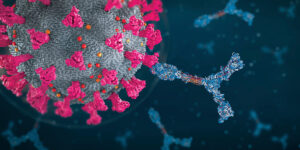In the United States, blood collection organizations, including the American Red Cross (ARC), started testing all donations for antibodies to SARS-CoV-2 as an incentive for donation and for the identification of COVID-19 convalescent plasma donors. From June 15 to November 30, 2020, prior to the availability of COVID-19 vaccines, the ARC collected 2,191,731 whole blood, red blood cells, and platelet donations from 1,531,221 donors. All donations were screened for SARS-CoV-2 seroreactivity using the Ortho VITROS anti-SARS-CoV-2 S1 (subunit 1 of the spike protein) total IG assay; seropositive donations were tested further using the Roche Elecsys Anti-SARS-CoV-2 Test, which targets the nucleocapsid protein. Among the 1,531,221 donors screened, 64,633 (4.22%) had one or more seropositive donations, and seropositivity increased from 1.18% the week of June 15th to 8.07% the last week in November 2020; most seroreactive donors had stable antibody levels for at least 120 days. Donors 16-17 and 18-24 years old were more likely to be seropositive than donors 55 years or older (odds ratio, 2.49 and 3.02, respectively). In addition, 45% of seropositive donors reported no symptoms of COVID-19. Screening blood donations is a productive way to screen a large number of healthy individuals for seropositivity of SARS-CoV-2 and compare epidemiologic findings to those reported clinically. Results reported in this study suggest a high number of asymptomatic infections, stable antibody levels for most individuals, and underreported SARS-CoV-2 infections prior to vaccine availability in 2020.
Reference:

